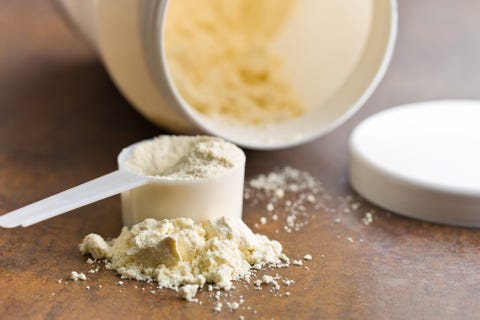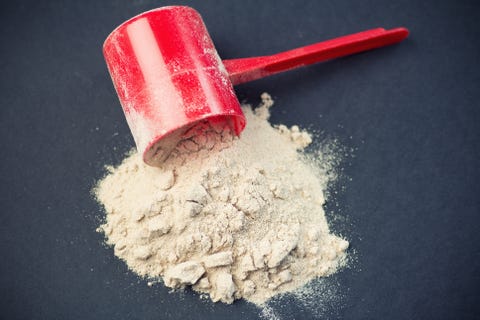When it comes to protein supplements, there are so many options to choose from. There’s pea protein. There’s soy protein. There’s even protein water. But there’s one protein source in particular that tends to get a lot of attention: whey protein.
Whether you’re looking to build or maintain muscle, consuming enough protein is important. But even if you aren’t big into lifting weights, protein is essential to keep your body functioning. You see, protein is actually made up of amino acids, which are often referred to as the “building blocks” of muscles, hair, skin, nails, and bones. (So if you’re not getting enough protein, your body is going to feel it.)
Men’s Health typically recommends that active men consume 6 to 8 palm-sized portions of protein rich foods per day, which works out to around 30 grams per meal. If you’re not meeting that mark—or if you’re training to stack on more muscle—it’s probably a good idea to supplement.
When it comes to choosing the protein supplement that’s best for you, first know that whey protein is often one of the best. Right off the bat, it is a complete protein, meaning it contains all the essential amino acids your body needs.
It’s not just us saying this: “The best protein possible is one that has all the essential amino acids, which allows you to build muscle faster,” says Sandra J. Arevalo, M.P.H., R.D.N., spokesperson for the Academy of Nutrition and Dietetics.
But what, exactly, is whey? Where does it come from and how is it made? And what makes whey so good for building muscle anyway?
We have answers.
What Is Whey?
It’s a byproduct of the dairy production process—which we realize doesn’t sound all that exciting, let alone delicious, but hear us out.
“All dairy products contain whey, one of the main proteins (besides casein) in dairy. During processing into a powder, the liquid milk is separated into solid curds (casein) and liquid (the whey),” says Monica Auslander Moreno, M.S., R.D., L.D.N., nutrition consultant for RSP Nutrition.
Whey has been found to promote gains in lean muscle mass and muscle strength as well as increase the body’s ability to repair muscles post-exercise.
“I personally love how there is so much research on the bioavailability and bioutility of whey proteins,” says Auslander Moreno. “It’s also incredibly useful for athletes in increasing muscle protein synthesis and usually comes with added bonuses of calcium and vitamin D.”
To make things slightly more complicated…
There are three types of whey protein:
Whey protein concentrate (WPC): “As its name suggests, the protein in here is concentrated. WPC maintains more nutrients than other types of whey because of the processing methods,” says Auslander Moreno.
Whey protein isolate: “It’s quicker to digest than WPC; it also is usually removed of all carbohydrate and therefore the lactose, making it suitable for many folks with lactose intolerance. Since most of the fat has been removed, so are a lot of the fat-soluble vitamins,” says Auslander Moreno. Still, check the label if you have trouble with lactose.
Whey protein hydrolysate: “This process breaks down the little building blocks of proteins, called peptides, and into an almost “pre-digested” state for quickest absorption (but whey on the whole digests pretty quickly). It also can sometimes taste bitter because of processing methods,” says Auslander Moreno.
Are there risks of consuming whey protein?
For starters, it may give you acne. Whey can mess with the production of acne-causing hormones, insulin and androgens, which can overstimulate sebum production and oil glands that cause acne.
But whey could also give you some stomach issues. “Any dairy -usceptible individuals—like those that are lactose intolerant—may experience gas, bloating, and diarrhea from too much whey,” says Auslander Moreno.
In very rare cases, people with pre-existing kidney issues could experience kidney damage and dehydration from taking too much whey protein. But speaking generally, “a one-time large dose of whey is unlikely to cause any immediate life-threatening issue besides gastrointestinal upset,” she says.
Are there benefits to consuming whey protein?
Absolutely. We covered a few above (muscle building, staving off protein deficiency), but there’s another big benefit to consuming whey protein: it’ll fill you up.
Research shows that consuming 25 to 30 grams of protein in a sitting can help you feel fuller for longer—a state that dietitians call “satiety.” The greater satiety you have between meals, the thinking goes, the less likely you are to get hungry and turn to mindless snacking on empty calories.
What are the best whey protein supplements?
We are so glad you asked. Here’s a list of our editors’ favorites.
This content is created and maintained by a third party, and imported onto this page to help users provide their email addresses. You may be able to find more information about this and similar content at piano.io




Comments are closed.